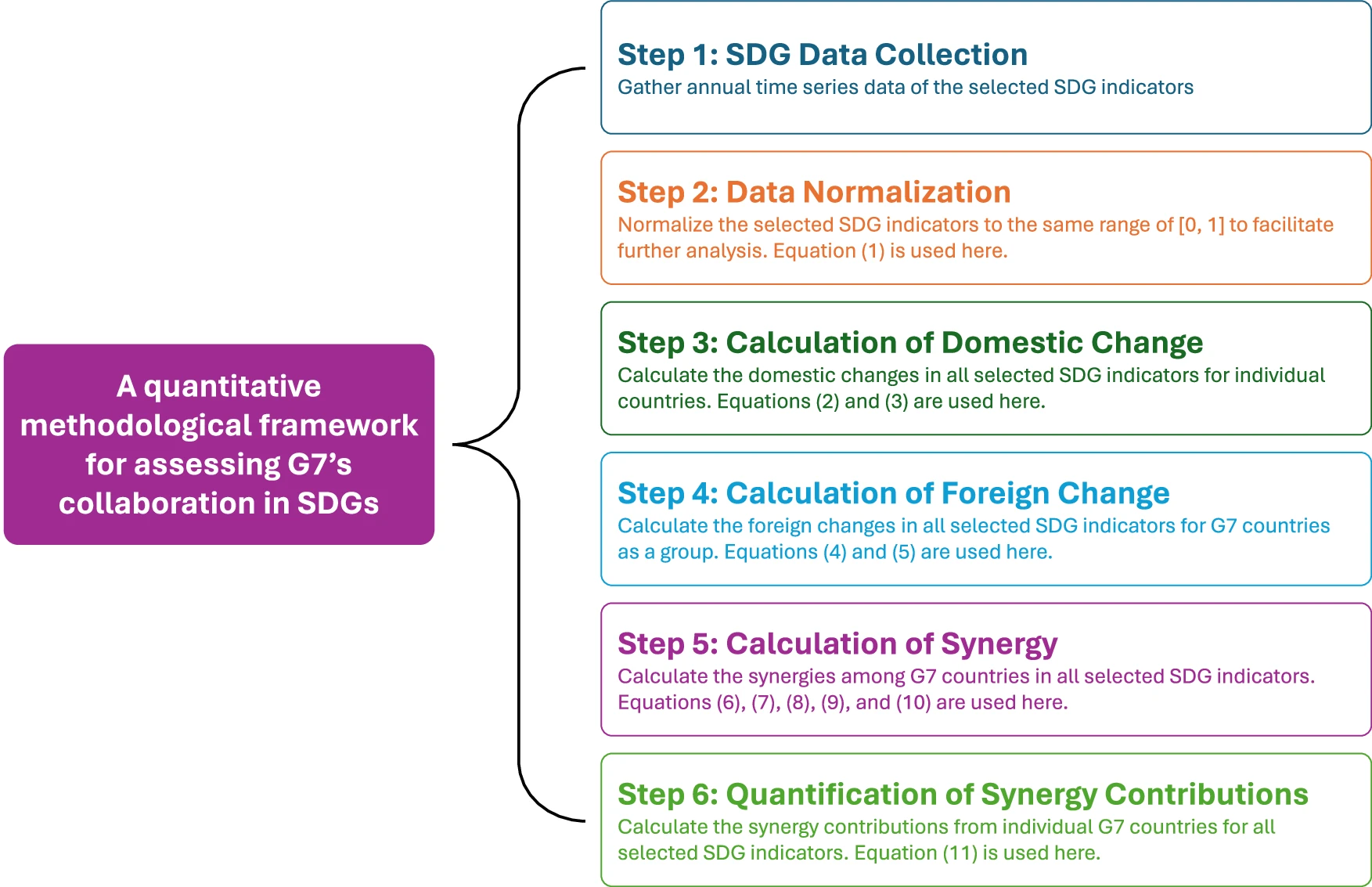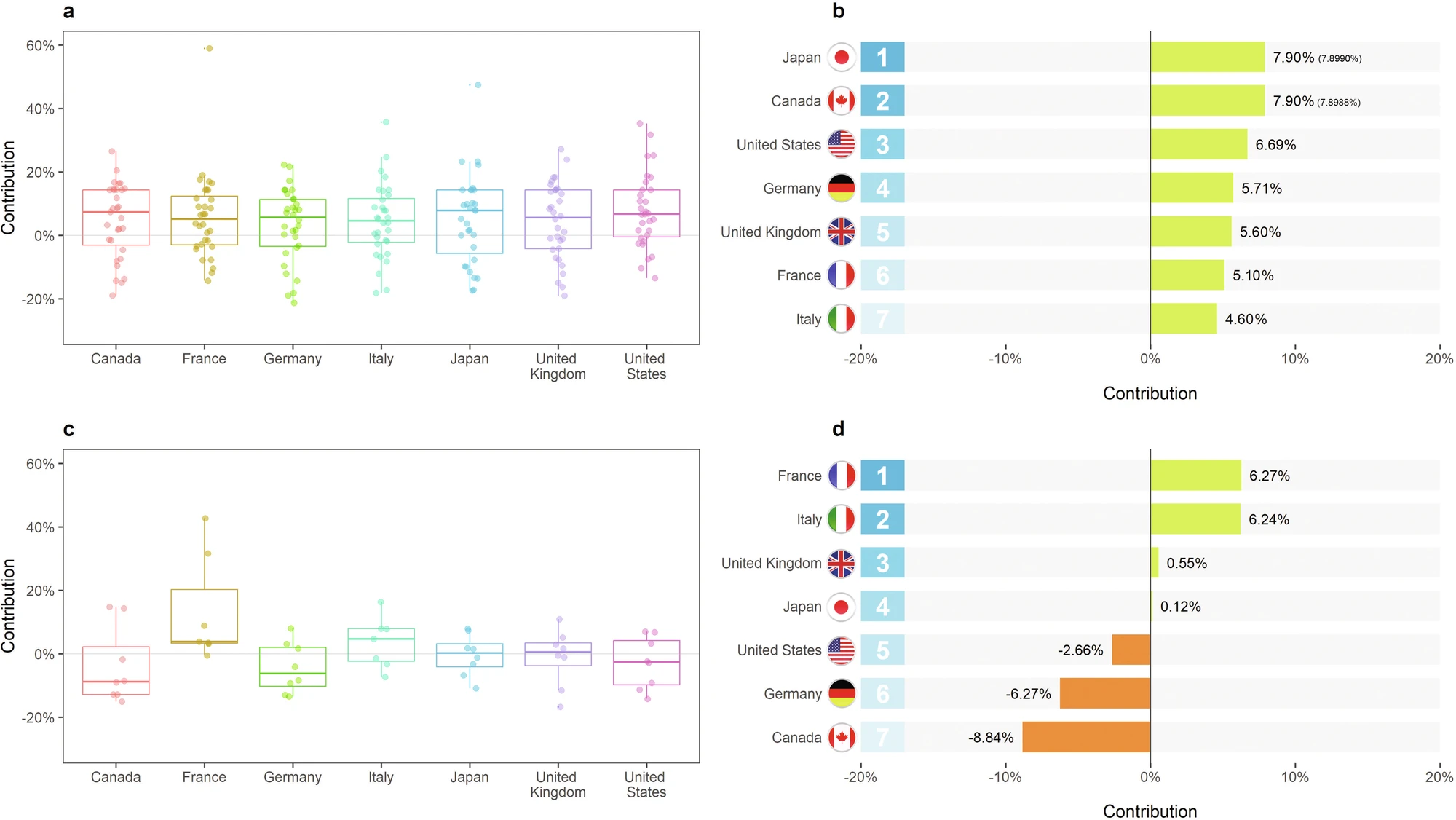More work needs to be done for G7 to achieve their SDGs
Published in Earth & Environment, Sustainability, and Law, Politics & International Studies
Background:
Since its adoption in 2015, the United Nations’ 2030 Agenda has underscored the need for international cooperation to achieve its ambitious goals. The Paris Agreement further highlights the importance of collective efforts, particularly in advancing scientific knowledge, community engagement, and capacity-building.
The Group of Seven (G7) – Canada, France, Germany, Italy, Japan, United Kingdom, and the United States – is often recognized as a pivotal force in advancing sustainable economic and environmental policies. As some of the world’s most developed economies, the G7’s dedication to the United Nations’ 2030 Agenda for Sustainable Development is crucial, not only for achieving global sustainability and protecting the planet but also how their actions can set a benchmark for other countries to follow. Despite their prominent role, few ways have been put forward to evaluate their actual level of cooperation (or lack of cooperation) towards these goals.
Our Approach:
While international collaboration is crucial, measuring the level of collaboration presents challenges, especially when avoiding rigorous, detailed assessments of national policies. The existing literature often fails to capture the dynamic interactions between countries, focusing instead on isolated national efforts or conducting detailed analyses that may become extremely complex. Additionally, some calculations are static and do not account for shocks or changes in the collaboration system, limiting their relevance for understanding real-time dynamics.
We addressed this issue by providing a robust quantitative assessment of G7 countries’ collaborative efforts in both economic and environmental SDGs. Our study introduces a methodological framework (see Fig. 1) based on synergy, which measures how different countries' actions, both individually and collectively, influence progress toward the SDGs. This approach allows us to quantify the level of cooperation and determine whether countries' efforts are reinforcing each other or working at cross-purposes.

Fig 1. Six key steps for the methodological framework to quantitatively assess G7’s collaboration efforts in SDGs.
Our Key Findings:
The most significant aspect of our findings lies in examining the synergy contributions of each G7 nation. Our analysis reveals the leaders in specific domains and highlights how individual actions shape the overall synergy within the G7 (see Fig. 2). Some of the key findings include:
- The overall synergy of G7 countries for the economic SDGs indicates that all seven countries have contributed positively to the G7’s collective economic progress.
- In contrast, overall synergy in the environmental SDGs suggests that G7 must further strength their collaboration in addressing the emerging environmental issues.
- Japan and Canada are the primary contributors to synergy in economic indicators among G7 nations, with median contributions of 7.9%.
- France (6.27%) and Italy (6.24%) are the leading contributors to synergy in environmental indicators, while the United States, Germany, and Canada exhibit negative contributions to overall environmental synergy.

Fig 2. G7’s overall roles in advancing the economic and environmental SDG indicators. (a) and (c) show the boxplots of median synergy contributions by individual countries to all economic SDG indicators and all environmental SDG indicators, respectively; (b) and (d) show the ranking of G7’s overall roles in advancing the economic and environmental SDG indicators, respectively. Note that the percentage contributions shown in (b) or (d) do not necessarily add up to 100% or -100%.
Our Recommendations:
Our analysis indicates that G7 countries have positively contributed to economic SDGs, suggesting effective policy alignment and cooperation in this domain. However, given the significant impacts of the COVID-19 pandemic, it is crucial for G7 countries to adapt and implement aggressive economic recovery measures. Some of these recommendations are:
- Fiscal Stimulus Packages: Governments should introduce large-scale fiscal stimulus packages focusing on infrastructure, digital transformation, and green energy projects to stimulate economic growth and job creation.
- Healthcare Investments: Increased investments in healthcare infrastructure and pandemic preparedness are essential to ensure resilience and long-term sustainability. This includes expanding healthcare capacities, securing medical resources, and developing comprehensive pandemic response plans.
- Support for SMEs: Targeted financial strategies, such as low-interest loans and tax relief, can help small and medium enterprises recover and thrive.
Furthermore, the G7 must enhance its collaboration on environmental issues. For countries with negative or small positive contributions to environmental SDGs, key recommendations include:
- Conservation Programs: Develop programs to conserve mountain ecosystems and biodiversity, including establishing protected areas and implementing species recovery plans.
- International Collaboration: Leverage collective resources for joint research, policy alignment, and conservation initiatives targeting transboundary ecosystems.
- Private Sector Engagement: Encourage private companies and non-government organizations to invest in conservation, adopt sustainable practices, and support local communities.
By strengthening their collaboration and focusing on both economic recovery and environmental sustainability, G7 countries can better contribute to achieving the 2030 Agenda and fostering a more sustainable global future.
Please check out our paper published in Nature Communications at https://doi.org/10.1038/s41467-024-51663-5 to learn more details.
Follow the Topic
-
Nature Communications

An open access, multidisciplinary journal dedicated to publishing high-quality research in all areas of the biological, health, physical, chemical and Earth sciences.
What are SDG Topics?
An introduction to Sustainable Development Goals (SDGs) Topics and their role in highlighting sustainable development research.
Continue reading announcementRelated Collections
With Collections, you can get published faster and increase your visibility.
Women's Health
Publishing Model: Hybrid
Deadline: Ongoing
Advances in neurodegenerative diseases
Publishing Model: Hybrid
Deadline: Mar 24, 2026





Please sign in or register for FREE
If you are a registered user on Research Communities by Springer Nature, please sign in